International Film Festival Bosnia Herzegovina Looks Around (IFFBHLA)
|
|
 |
|
|
Bosnia and Herzegovina |
|
Croatia |
|
Serbia |
| Montenegro |
|
North Macedonia |
Slovenia |
|
Albania |
|
Worldwide |
|
|
IFFBHLA --- 1st PARIS EDITION
|
|
MAIN AWARD
For the most challenging and convincing film
|
|
|
Andrej Volkashin |
North Macedonia / 2019 / 0:20:00 |
A bitter-sweet story about an unusual friendship between a nine year old daredevil MARIO and an eccentric young gay man, challenged by the prejudices and hatred of the parents in a remote Macedonian small town.
|
|
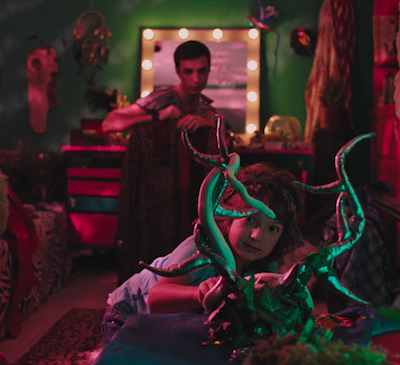
|
JURY STATEMENT:
A bitter-sweet story about an unusual friendship between a nine year old daredevil MARIO and an eccentric young gay man, challenged by the prejudices and hatred of the parents in a remote Macedonian small town. e and original depiction of an important topic in today’s world, the nature of violence, the Jury decides to award the main prize in the Short Films Competition to the film “Snake” by writer/director Andrey Volkashin.
Through captivating visual storytelling, the film follows a young kid from a provincial town in Macedonia who discovers the world around him with playful curiosity. Employing a vibrant cast of young non-actors, all speaking in a local dialect, the film brings to the screen a Balkan authenticity which is gripping and which meticulously sets the tone for the ensuing dramatic conflict. Through convincing acting, as well as well-scripted dialogues that feel organic, the film steadily constructs the premise that violence is always culturally conditioned, a type of group-phenomenon, and not inherent to the individual.
Upon accidentally witnessing a young homosexual’s secret dress-up in drag, the protagonist digs out his mother’s wedding dress and initiates a sort of dress-up party with his group of friends in which he cross-dresses in female clothes and makeup. Then, upon having endured his father’s unforgiving belt whipping, he gathers up the same group to intercept the young homosexual’s path in the dark and stone him as punishment. However, in the film’s final scene, the protagonist witnesses the consequences of his aggression by seeing the pain in which the young man lies on the street after the attack. In a breaking point, the protagonist separates from the group and approaches his victim, realizing that what he did was wrong, and asking him for forgiveness.
This final act of the film is the author throwing a rock which knocks down the previously built narrative tower – it deconstructs the premise that all behavior is pre-conditioned and influenced by the surrounding. Then, in the freed space, the film suggests a more optimistic conclusion: that through empathy humanity can be better, regardless of context. This humanistic viewpoint is relevant both in the context of the LGBT community living in the Balkans, but also in a more universal sense, anywhere in the world where there is some form of suffering inflicted by people.
|
DIRECTOR STATEMENT:
We filmed "Snake" in the rural south-eastern Macedonia, where my nostalgic childhood memories seem to reflect with the sunset over the surface of the vast, swampy lake. This is a place of long summers and carefree childhood, contrasted with the pain of growing up. I grew up in a rural area much like the one depicted in Snake, played with lizards and frogs, and dreamt about being a filmmaker one day, a dream that seemed so far away. This is why I decided to cast children from the area of Lake Doiran, with no prior acting experience. I wanted them to feel the magic of filmmaking. I guided all of their performances as a game which wasn't always easy, but what is more important is that they really enjoyed the process and had a lot of fun. Therefore, the producer Elena Stanisheva and I would like to devote this award to our little heroes, the child actors from the area around Doiran. Merci beaucoup! Thank you! |
FUTURE AWARD
For films offering ideas and perspectives for a sustainable future
|
When I ´m at home
Kada sam kod kuce
|
|
Ivana Todorovic |
Serbia / 2019 / 0:16:00 |
0 Marija is coming home to Belgrade after several years abroad to face a trauma from her past.
|
|
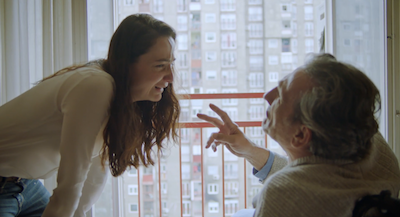
|
JURY STATEMENT:
Acknowledging the delicate and layered treatment of coping with a difficult past experience, the Jury gives the Future award to the film “When I’m at home” by Ivana Todorovic. Focusing on a female protagonist who returns home where she was sexually molested by her uncle, the film deals with the consequences of having experienced violence from somebody close.
Through economical use of dialogue and meaningful silences, the film focuses on the individual experience of the victim facing the offender after a longer time period. Although years have passed and the victim has built a new life, the film suggests that the accumulated anger is only suppressed – once alone with the now weak and ill uncle, the protagonist gets the urge to forcefully drive his wheelchair to the balcony and tip him over. Yet, she stops before the edge, seeing how he is completely powerless and incapable of defending himself. As they face each other, in a long dialogue-less shot filled with tension, she reclaims her power as a woman.
The film ends outside of the apartment with a brief meeting between her and her cousin, suggesting that the protagonist has received the necessary closure and is looking ahead at a more hopeful future for herself.
Coming from the Balkans, this story is also relevant in the broader social context of post-war living, where many women who experienced rape and sexual trauma never got the chance to heal.
|
DIRECTOR STATEMENT:
Thank you Jury members for recognizing our film and giving us the award. Its so important to us to open up the dialog about facing sexual abuse in the family and show the importance of the healing process for a woman. As a documentary filmmaker, I was working for several years on this theme and searching for the angle to tell this important story. I found out that facing the abuser in the family is very rare among the victims. I enrolled in Master studies in Fiction Film at the Faculty for Dramatic Arts in Belgrade to learn how to make fiction films and address this issue. With scriptwriter Melina Pota Koljevic, we developed the story and she wrote the script. 30 students and 3 professional actors worked on the film, everyone with the same passion; to make a good, strong, and important film. Your award is showing us we made it! Hopefully the film continues to travel the world and spread our message.
|
SENSITIVITY AWARD
For films based and focused on sensitive insights including enigmatic dimensions
|
Why is Mom Always Crying?
Zasto mama vazda place?
|
|
Karmen Orbdalj |
Bosnia and Herzegovina/ 2019 / 0:16:00 |
"It was enough for me to think day and night about you." Ena discovers her parent’s love letters. They sent each other letters while they were separated in the war, in the most hopeless place in the world - Bosnia and Herzegovina. She goes on a trip to the City from her childhood “Pustograd” and she recalls the almost impossible love of her parents. When the war in Mostar begin, Ena's parents, a married couple of different nationalities, moved away from the war from Mostar to Pustograd where Ena's father is taken into captivity. Ena and her mother are left alone in the world. They live in anxiety and fear, not knowing if their other half is dead or alive. Six months after Ena's father is taken, Ena and her mother receive the first letter. The letter comes in unaddressed, unfamiliar way. That is the start of their exchange of letters; months go by when they cannot hear from each other, while Ena and her mother tremble for his life.
|
|
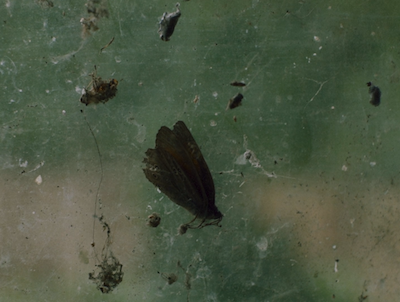
|
JURY STATEMENT:
The jury is thrilled to announce that this year’s SENSITIVITY AWARD in the Short Film Competition goes to ‘Why Is Mom Always Crying?”, directed by Karmen Orbdalj. With its gentle pacing, mesmerizing narration, and stunningly beautiful imagery, the film manages to evoke a complexity of emotions rooted in a memento of the recent war in Bosnia & Herzegovina: personal love letters. While the film doesn’t venture into any sociopolitical observations or statements, it does offer an intimate personal story through which the human tragedy of war is fully exposed in front of us. Somehow the visual, narrative, and historical elements all merge into one poetic whole that powerfully captures the emotions and wounds of the country’s troubled past.
|
DIRECTOR STATEMENT:
My team and I are very grateful and thrilled about the award. Since we are young authors, this award means a lot to us. I’m delighted the film won the Sensitivity Award because the tenderness and sensibility is the focus of the film. Although the circumstance is war, the film is an utterly "anti-war film" and focuses on subtle children’s emotions. Such an approach to work was important to us in order to bring closer to the viewer - the beauty of love and the horror of war. I'm glad you recognized our work that we planted with love into the film. Thank you.
|
MENTION FOR THE SENSITIVITY AWARD
|
|
|
Jonian Bisai, Sotiris Tsiganos |
Albania, Italy, Greece / 2019 / 0:24:21 |
Katër i Radës was the first boat that sank in a naval blockade against migration flows. Now it is a monument for global migration established by the same authority that ordered its sinking. During the civil war in Albania more and more people were seeking a way out. On 28 March 1997, at the port of Vlorë, Albania, 120 people boarded the vessel Katër i Radës bound for Italy. In the Otranto Canal, the Italian navy warship Sibilla intercepted the Albanian ship, using military manoeuvres. The military action was part of Operation White Flags (operazione Bandiere Bianche), by mutual agreement of the Italian and Albanian state, which gave the Italian navy permission to patrol the entire Otranto Canal and prevent Albanians from escaping the country. The Albanian boat sank, causing the death of 81 people, including women and children; justice for this still has not been done. In the film, four female voices interweave a polyphonic narration of the story, asking questions ignored by the media and the court. The relatives of the victims perform a voyage by crossing the Mediterranean Sea following the same route. During the voyage they reexamine the traces of the event and the transformation of the shipwreck from evidence into a context-free sculpture. In front of the distorted shipwreck, a restorative act brings back the missing memory.
|
|
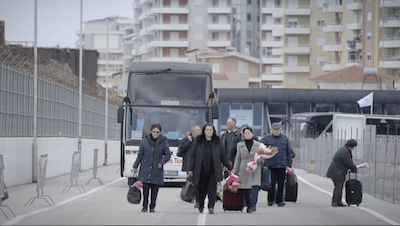
|
JURY STATEMENT:
The jury would also like to make a special mention of the film “Otranto”, directed by Jonian Bisai and Sotiris Tsiganos. This short documentary film brings to light a little known tragedy which occurred in the late 1990s in the Strait of Otranto between Albania and Italy. The film follows family members of the victims as they come together to commemorate those who lost their lives. The search for justice is intimately felt throughout the film and the reading of each victim’s name at the end forces the viewer to process this human tragedy on an individual level. It is a powerful and raw way of honoring the victims — not necessarily a crowd-pleasing section of the film, but one that underscores the directors’ commitment to purveying this human tragedy directly and honestly.
|
DIRECTOR STATEMENT:
I would like to thank you for giving me this amazing news that our film was awarded for its sensitivity. We would also like to thank the jury and the festival for the wonderful comments and the opportunity to participate in the festival.
"Otranto" pulls the curtain and sheds light on the aftereffects of a migration tragedy after twenty-one years. It is a story of refusing to forget and resisting to reconcile with injustice, offering context for viewers on unprecedented historical events and muted voices. The film creates a living monument for the tragedy of Otranto. A time-based monument where the protagonists themselves turn the camera towards their continuous journey to justice.
|
SURPRISE AWARD
For films touching important subjects and offering information in an astonishing and conclusive way
|
|
|
Georgi M. Unkovski |
North Macedonia / 2019 / 0:18:45 |
After an unsuccessful attempt to renew his car registration, Dejan (37) falls in a bureaucratic trap that tests his determination to be a responsible father.
|
|
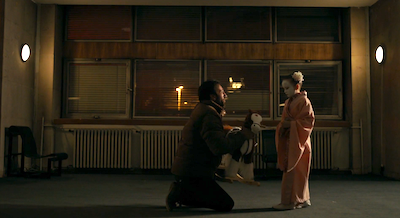
|
JURY STATEMENT:
For the SURPRISE AWARD in the Short Film Competition, the jury has selected “Sticker” — directed by Georgi M. Unkovski — as this year’s winner. A series of absurd events drive the film’s narrative which evokes frustration, compassion, and laughter as the story unfolds. This emotional rollercoaster is entertaining cinema, but the surprising depth that arises from the film’s storyline is what helps it shine. Even though the film takes place in North Macedonia, the bureaucratic headaches, human misunderstandings, and a parent’s unwavering love for his child are universal topics that are easily relatable. As such, “Sticker” manages to capture the viewer’s full attention and sympathy while being careful not to take itself too seriously. It is a tasteful mixture of absurdity, comedy and human psychology, impressively captured in under 20 minutes.
|
MENTION FOR THE SURPRISE AWARD
|
Autumn Waltz
Jesenji Valcer
|
|
Ognjen Petkovic |
Serbia Montenegro / 2018 / 00:18:16 |
A couple are trying to reach freedom from a besieged town. They know there is a barricade with soldiers on the road. To pass it, they need permission, which they don't have. But the man says the word "Lemon", which could be their path to freedom.
|
|
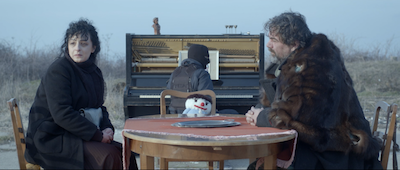
|
JURY STATEMENT:
The jury would also like to acknowledge the short film “Autumn Waltz”, directed by Ognjen Petkovic. Set during the recent Yugoslav Wars of the 1990s, the film manages to capture the barbarism and cruelty of war without giving in to melodrama. With a stroke of lighthearted absurdism and a circus-like atmosphere, “Autumn Waltz” poignantly exhibits the brutality of murdering “the other” — civilians and former compatriots who are now the enemy. It’s all seemingly black and white, except it is not. In the end, an iota of humanity surfaces to the top, and lives are spared for the simple reason that a drink was paid for at a bar as a friendly gesture in the long forgotten past. That something like that could be the difference between life and death is absurd in and of itself, but so is war — and survival based on seemingly impossible chance evens is never out of the ordinary. The film is accompanied by a Chopin piece performed on a broken, out-of-tune piano which at the end beautifully transitions into a proper in-tune piano. This melancholic moment is a symbolic conjunction of the circus-like state of war and the emotional weight of survival and fear.
|
I´m not Telling You Anythin, Just Sayin´
|
|
Sanja Milardocic |
Croatia / 2020 / 0:17:41 |
Zrinka arrives to her hometown for few days to do some location scouting. She stays at her mother Tanja's place. Since Tanja's behaviour seems strange, Zrinka takes her location scouting in order to find out what is troubling her. Finally, Tanja's emotional breakdown brings the two closer together.
|
|
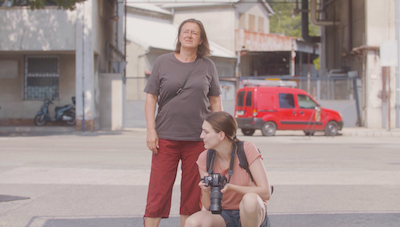
|
JURY STATEMENT:
“I’m Not Telling You Anything, Just Sayin’” is a short film by Sanja Milardovi? that investigates the shift in the relationship between a young woman and her lonely mother who is apparently starting to show strange behaviors. This shift is tackled with an ingenious directing, deep scripting, excellent acting, smooth lighting, pronounced sceneries, and meaningful editing. The film operates with a narrative line that ingeniously merges the action plot with the intimate one. The photographer daughter, who is in charge of finding and shooting locations for a written script, asks her mother to accompany her on an outdoor shooting mission. This is when the characters step into different locations that are shown as metaphors for the daughter/mother relationship, where the daughter’s quest to find the right places goes in parallel with the quest to rediscover the deep self of her mother. The intense climax shakes the characters through the emotion that takes control over their affects: the mother unintentionally falls down on the ground, starts crying, and is then held by the daughter in her arms. The latter finds out in this out-of-script forest a renewal for the way she shows her love to her mother. The film becomes itself an awareness about the conditions that older people are facing in today’s society, where loneliness and depression are often present. |
|
|
|